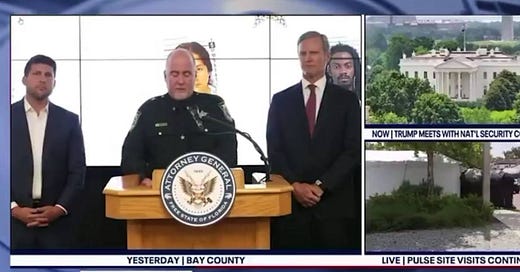Florida DMV Employees Arrested in Commercial Driver's License Fraud Scheme
Investigation reveals systematic violations as federal debate intensifies over non-citizen driving privileges
Eight individuals, including two Florida Department of Highway Safety and Motor Vehicles (FLHSMV) employees, were arrested in Bay County, Florida, for their alleged involvement in a fraudulent driver's license scheme targeting undocumented immigrants. The investigation, conducted by the Bay County Sheriff's Office, Florida Highway Patrol, and Homeland Security Investigations, uncovered a network issuing driver's licenses, including Commercial Driver's Licenses (CDLs), without requiring legally mandated tests in exchange for cash payments.
Surveillance footage and financial records revealed that FLHSMV employees Bancelie Velazco and Demetrius Smith II facilitated the issuance of fraudulent licenses. Individuals, often undocumented immigrants, reportedly paid between $1,500 and $4,000 per license, either directly at the DMV or through cash apps like Cash App and Zelle. Third-party intermediaries, described as "runners," coordinated the process, with some individuals traveling from across Florida and neighboring states to the Panama City DMV office in Bay County to obtain these licenses. Over 1,000 fraudulent licenses may have been issued from this single location, though the exact number remains under investigation.
The arrests highlight ongoing concerns about the integrity of driver's license issuance in Florida, particularly in light of the state's strict policies against issuing licenses to undocumented immigrants. Since July 2023, Florida has enforced Senate Bill 1718, which prohibits issuing driver's licenses to individuals without proof of lawful presence and invalidates out-of-state licenses issued exclusively to undocumented immigrants. The scheme allegedly exploited vulnerabilities in the system, allowing individuals to bypass federal REAL ID Act requirements and Florida's residency and testing standards for CDLs.
The case has amplified national debates over non-domiciled CDLs, which allow certain non-citizens with valid work authorization—such as those with Employment Authorization Documents (EADs) or unexpired foreign passports with an approved I-94 Arrival/Departure Record—to operate commercial vehicles in the U.S. Federal regulations, overseen by the Federal Motor Carrier Safety Administration (FMCSA), permit these licenses but exclude citizens of Canada and Mexico, whose home countries meet U.S. testing standards. Non-domiciled CDLs are marked to indicate their status and are subject to strict verification protocols.
Critics, including some trucking industry groups, argue that non-domiciled CDLs pose safety risks and contribute to "labor dumping," where foreign drivers are hired at lower wages, undercutting U.S. workers. A petition from a group referred to as American Truckers United (though not explicitly verified in official records) has called for a ban on non-domiciled CDLs, citing these concerns. However, the American Trucking Associations (ATA) has refuted these claims, asserting that non-domiciled CDLs are tightly regulated and that allegations of widespread safety or economic harm are unfounded. The ATA has emphasized the need for objective enforcement of existing regulations rather than blanket bans.
In April 2025, President Donald J. Trump signed an executive order directing the Department of Transportation, through the FMCSA, to review non-domiciled CDL issuance for irregularities and strengthen protocols for verifying the authenticity of commercial driving credentials. The order also mandated rescinding prior guidance that weakened English proficiency requirements for CDL holders, reinforcing that drivers must demonstrate sufficient English skills to read traffic signs, communicate with authorities, and comply with regulations. This executive action reflects growing federal scrutiny of CDL programs amid concerns about fraud and safety, potentially foreshadowing stricter policies.
The Bay County case underscores the challenges of balancing immigration enforcement, roadway safety, and regulatory oversight in the trucking industry. As the investigation continues, authorities are working to identify and revoke fraudulent licenses to prevent unqualified drivers from operating on U.S. roads. The outcome of this case and the federal review may shape future policies governing non-citizen access to commercial driving privileges.
Sources: Fox 35, Federal Motor Carrier Safety Administration, FMCSA, White House, Overdrive Magazine, American Truckers United Petition




